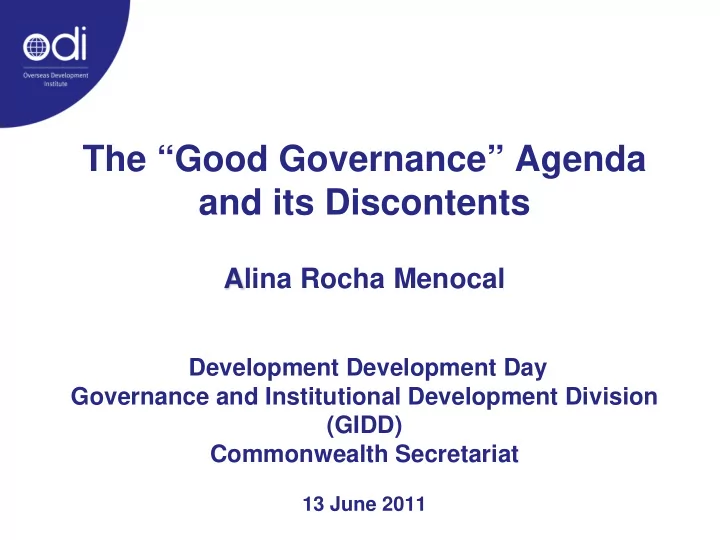

The “Good Governance” Agenda and its Discontents Alina Rocha Menocal Development Development Day Governance and Institutional Development Division (GIDD) Commonwealth Secretariat 13 June 2011
Outline Defining Governance “Good Governance” and development “Good Governance”: key principles Have “Good Governance” programmes worked? “Good Governance” agenda: challenges and limitations “Good enough” governance? Key lessons and implications Challenges to donor uptake 2
Defining Governance Governance means more than just ‘government’ It has to do with the nature of relations between state and society It is also process-oriented – how not just what is done 3
Defining Governance Based on the above, governance can be understood as: The rules that regulate the public realm – the space where state as well as economic and societal actors interact to make decisions and the processes and institutions, both formal and informal, through which public authority is exercised 4
Defining Governance Five key institutional arenas of governance include: Civil Society Political Society Executive Bureaucracy Economic society Judiciary
“Good Governance” and Development Term emerged in 1990s from growing concerns about governance “Good Governance” defined as essential to promote development, build capacity, and combat poverty (e.g. UN, Commission for Africa, DFID, World Bank, Commonwealth Secretariat, etc.) Concept of “good governance” is broad but there is agreement on several key principles 6
Good Governance: Key Principles Participation and inclusiveness: involvement and ownership by a broad range of stakeholders Accountability: decision-makers responsible for their actions; checks and balances in place; etc. Respect for institutions and laws: rules apply equally to everyone in society; corruption is controlled; etc.
Good Governance: Key Principles Effectiveness: performing key functions and delivering basic services Transparency: clarity and openness of decision-making Efficiency: government is effective and responsive; functioning regulatory framework is in place; etc. Often ‘good governance’ also implies a properly functioning democratic system
Have “GG” interventions worked? Since the 1990s, substantial resources have been devoted to improve governance, including public sector reform and the way the central government works OECD governments spend over US$10 billion a year on governance interventions Yet, results have been disappointing—e.g., anti-corruption commissions and civil service reforms.
“GG” agenda: some challenges and limitations Three particular areas should be highlighted: Normative slant of the GG agenda Technocratic approach to development Excessively comprehensive and demanding agenda 10
“GG” agenda: Normative slant Overly idealistic and normative view of the political process Reliance on blueprints and best practices transplanted from the developed world despite mantra of “no one size fits all” Excessive reliance on standardised approaches focused almost exclusively on formal institutions. Fresh perspectives rooted in local realities have been lacking. 11
“GG” agenda: Normative slant Donors reward organisations and institutions that adopt “modern” or “best practice” forms only superficially. And they have shunned informal institutions and personalised relationships as governance problems, while recent research suggests they are not always so. 12
“GG” agenda: Technocratic approach Tendency to see development as a technocratic exercise. Implicit assumption that “all good things go together” without sufficiently recognising that politics matter. Lack of awareness of the political nature of reform processes: reforms entail changes in formal arrangements but more fundamentally are about changing informal behaviours and altering power relations. Changing the way governments work poses political risks: e.g., trade-offs between providing public goods and serving powerful vested interests. 13
“GG” agenda: Agenda overload The “GG” paradigm implies a very wide range of institutional preconditions for development. It calls for improvements that touch virtually all aspects of the public sector. But the long list may be beyond what is needed or feasible and is a-historic. Asking institutions to do too much too soon threatens to undermine longer-term capacity. There is little guidance about what is and what is not, what should come first and what should follow, etc. 14
“Good enough” governance? “GEG” is based on a more instrumental, selective, and pragmatic understanding of governance. The concept suggests that not all governance deficits can be tackled at once. “GEG” promotes governance reforms in a more realistic way starting with where a particular country is . 15
“Good enough” governance? The emphasis is on the minimal conditions of governance that are necessary to allow development: This implies that interventions need to be prioritized, made relevant to contextual realities, and assessed in light of historical evidence, sequence, and timing. However, “GEG” does not address question of whether there should be minimum standards, which may be a slippery slope. 16
Key lessons and implications Starting with the local context: – Develop solid understanding of domestic dynamics at work, and – Tailor interventions accordingly. Moving away from normative prescriptions encouraging multiple paths to institutional performance: – “Best fit” over “best practice” Recognising development as fundamentally political: – Be realistic about what is feasible – Focus on fostering enabling environment and influencing incentives 17
Key lessons and implications Focusing first on basic reforms and sequencing reforms accordingly: – Modest and selective entry points can have partial success and can lay the basis for later progress. Recognising long-term nature of promoting development. Sound political economy analysis may be a useful tool. 18
Challenges to donor uptake Donors have begun to grapple more seriously with the limitations of the GG agenda, take context as the starting point, and recognise the political nature of development. But there is still a big gap between rhetoric and practice. It has proven difficult for donors to absorb and act on lessons . Truly internalising these would require undertaking reforms to their own organisation, values, practices and behaviour, which is not easy. 19
Recommend
More recommend